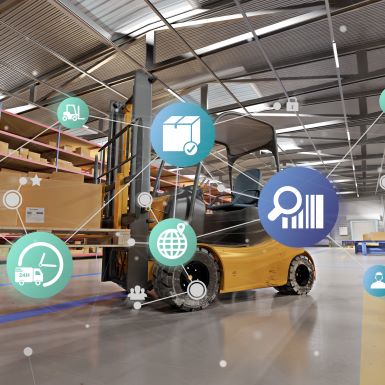Application round 1 deadline: 21/05/2022
Application round 2 deadline: 30/09/2022
ANNOUNCEMENT OF OPPORTUNITY
The intended Announcement of Opportunity targets the development of services and products for supporting the digital transformation of the traditional supply chains, particularly in relation to sensitive goods transport. Among these, pharmaceuticals goods, vaccines, medical equipment, as well as luxurious but also perishable or dangerous goods, which impose specific logistics challenges.
At the core of the challenge is not only organising the services that carry the sensitive goods but rather making sure that every part of the supply chain is running, to avoid losses throughout the system and prevent delays that could damage the goods due to unstable temperatures. Specific attention is placed on food supply chains, pushed by the need to make global food systems more transparent, traceable, and accountable so that diseases are less likely to jump undetected from animal to human.
In the aftermath of severe disruption from the pandemic, enterprises have started to plan their supply chain strategies to become more resilient, collaborative, and networked with customers, suppliers, and other stakeholders. To do that, there is an increase in investment in supply chain technologies like Artificial Intelligence (AI) and robotic process automation.
The novelty of this call consists in addressing these challenges that would set the groundwork for a new era of supply chain management, leveraging on space and digital tools to provide end-to-end visibility, traceability, flexibility, responsiveness, and agility with the potential for reshaping and digitally transforming the face of the freight logistics.
SCOPE

To fully address the needs of today’s stakeholders in every part of the value chain and to provide the expected end-to-end visibility and traceability of the goods, this thematic call fosters the development of innovative solutions that create supply chain value using digital solutions such as big data analytics and machine learning to produce insights for decision-making, problem-solving, manage movements from supplier nodes through distribution routes and automating supply chain process execution.
To achieve the objectives and address the above use cases, the proposed services shall rely on innovative space technologies and data, such as:
- Hybrid 5G space/terrestrial communication networks.
- Ubiquitous high accuracy PNT (Positioning, Navigation and Timing) technologies to support accurate and seamless indoor-outdoor positioning provided by GNSS (Global Navigation Satellite Systems), 5G and other complementary terrestrial and on-board systems.
- Advanced GIS (Geographic Information System) for spatial information management, including utilisation of satellite EO (Earth observation) data to monitor risks along the supply chain such as environmental risks.
Examples of use cases addressed by the call are:
- Connected supply chain of sensitive goods - to improve the connection amongst all actors of the supply chain with increased visibility, responsiveness, and resilience across the entire ecosystem.
- Predicted demand in the supply chain – Internet of Things (IoT) combined with predictive analytics and AI/Machine Learning (ML) can monitor, collect, and report information from the environment and reliably predict demand, recognize patterns, anticipate changes and optimise supply chain processes including distribution and warehouse planning.
- Automation of operations - leveraging space data and digital technologies such as AI, ML, Augmented Reality/Virtual Reality, and robotics can lower the operational costs of delivering goods and provide more reliable forecasts, analysis of trend data and better services to customers.
- Monitor the goods - by receiving real-time location and condition data from sensors on sensitive goods shipments on route, it is possible to continuously run data analytics monitoring sensitive parameters such as temperature and tilt, and other dynamic intelligence to manage and optimise distribution flows.
- Managing the Risks - leveraging space and digital technologies and capabilities, such as sensors, robotics, automation and predictive analytics, the transparency and communications throughout the entire supply chain can increase and risks, ranging from weather and natural disasters, to theft and counterfeiting, traffic and port congestion, and others, can be identified and addressed.
WHAT ARE WE LOOKING FOR?
The call offers the opportunity to companies to bring forward their business propositions, which will leverage on space and advanced digital technologies for delivering sustainable solutions in the supply chain sector. This thematic Call is issued under the ARTES BASS and 5G Programme lines, the latter specifically subject to technical / business justifications on the use of hybrid SatCom - terrestrial 5G networks.
For this call, companies residing in the following Member States will be eligible to apply: Austria, Belgium, Czech Republic, Denmark, Estonia, Finland, France, Germany, Greece, Hungary, Ireland, Italy, Luxembourg, the Netherlands, Norway, Poland, Portugal, Romania, Spain, Switzerland, and the United Kingdom.
Greek companies participation is limited to the 5G SPL only subject to Greek national delegation approval and technical / business justifications on the use of hybrid SatCom - terrestrial 5G networks.
Economic Operators, intending to respond to this Thematic Call are requested to inform their National Delegations of their intention to submit a proposal as soon as possible, prior to the submission of the Outline Proposal.
Contact information can be found under: National Delegations.
Further details regarding the funding call can be found on esa-star.
Please upload the Pitch Questionnaire using the online web submission form.
WEBINAR
- Round 1 webinar: 11:00 CET, 12 January 2022
- Round 2 webinar: 11:00 CEST, 6 July 2022



